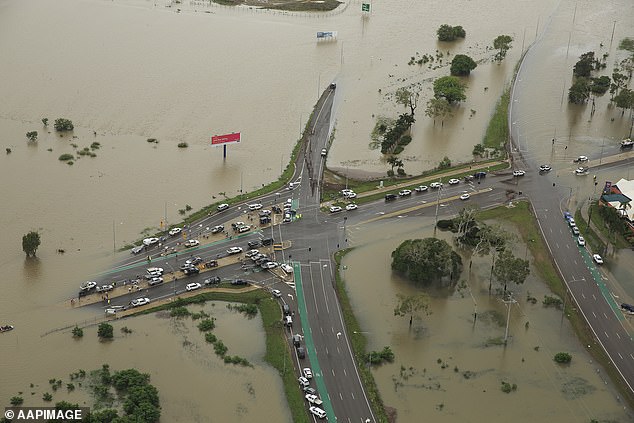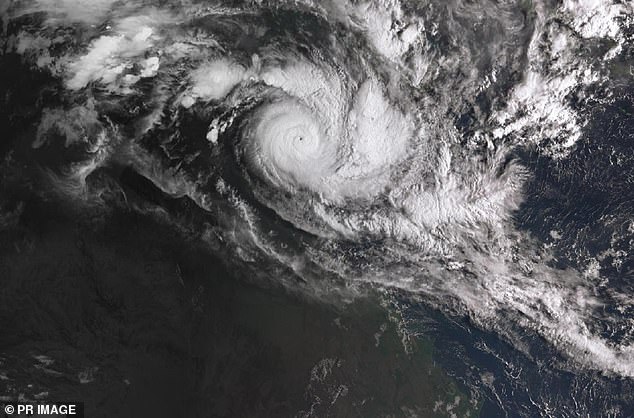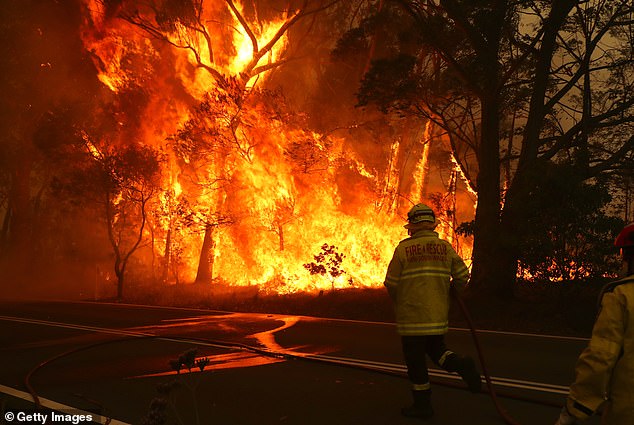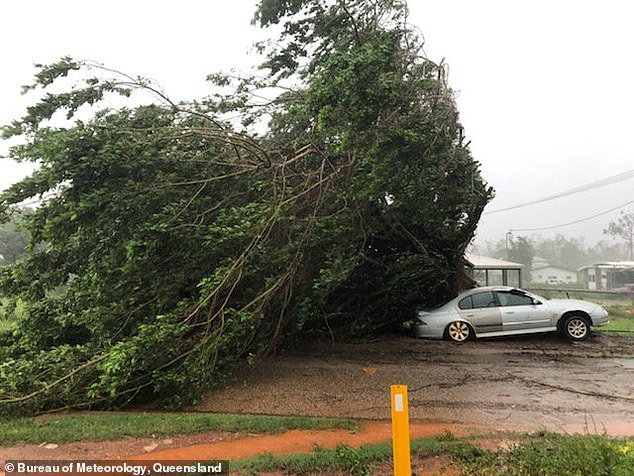Bushfire-ravaged Victoria, New South Wales and South Australia may have $451 million in GST revenue cut to pay for previous flooding and cyclones in Queensland.
The cuts are due to an unfortunately-timed change in how GST revenue for natural disasters is assessed, which occurred before the recent catastrophic bushfires.
Bushfire-affected states will themselves benefit from this change and will be compensated for their fires – but must wait up to three years for it to flow through.

Townsville disappears under water in February, 2019. Queensland suffered repeated cyclones since 2016 and complained about new GST rules excluding local government spend

Cyclone Trevor hit Queensland in March, 2019. States get reimbursed for out-of-pocket disaster expenses by the GST but can wait up to three years for the money
The Commonwealth Grants Commission is an independent body within Treasury that advises the Federal Government on how much each state should get from the $68 billion GST revenue pool.
It does this by assessing each state’s expenses and their ability to raise tax money, called ‘fiscal capacity’.
The Commission last year decided to exclude local government spending on natural disaster recovery from GST funding.
Because GST funds go to the state and territory governments, not to local governments, it was deemed unfair to reimburse the wrong entity.
But Queensland complained, resulting in the Commission changing its rules back to its 2018 funding model.

Firefighters run to move their truck during a raging bushfire at Bilpin northwest of Sydney on December 19. Bushfire-hit states will themselves benefit from the change to include local government disaster spending in the GST allocation but must wait up to three years

The disaster-prone state was hit by floods in 2016.
It was smashed by Cyclone Debbie in March 2017, Cyclone Nora in March 2018, and again in March 2019 by Tropical Cyclone Trevor, along with repeated floods.
Queensland said its local governments were unable to pay for natural disaster relief, and that the State government had paid the councils – so therefore the state should be compensated with more GST money.
If the Commission’s recommendations, published in November in its Significant Changes position paper, are adopted, Queensland would receive an extra $350 million to pay for disasters from 2015-16 to 2017-18.
The change would also see a recommended cut of $207 million from Victoria, $170 million from NSW and $74 million from South Australia.
The Commission’s proposal is now seeking State and Territory views on the issue before presenting its final recommendation in the 2020 Review report due by February 28.
The Federal Government has the ultimate say over the distribution of funds and it is unknown as yet whether it will dismiss the proposal.
Daily Mail Australia is awaiting comment from Treasurer Josh Frydenberg’s office.
Daily Mail Australia understands that the bushfire-ravaged states will not be disadvantaged as they will immediately apply to the Federal Government for disaster recovery funding, which would be given in the next Budget.
The Commonwealth Grants Commission (CGC) then assesses their out-of-pocket expenses over the next two to five years.
Bushfire-ravaged Victoria, New South Wales and South Australia will therefore receive natural disaster funding from the GST distribution – with local government expenses included – but will have to wait for the extra money.
The CGC said in a statement to Daily Mail Australia that the Federal Government meets a ‘significant proportion’ of natural disaster costs through the Disaster Recovery Funding Arrangements.
GST distribution reimburses the states for their remaining expenses, and that is shared among the states as disasters occur, but with a time lag.
‘The costs to NSW, Vic and SA occurring this year (2019-20) will be recognised through the GST distributions occurring in 2021-22, 2022-23 and 2023-24,’ the CGC said in an emailed statement.
The Victorian Government has complained about the CGC proposal, telling the Australian Financial Review that it wants the Federal Government to dismiss it.
‘This proposal clearly falls well short of community expectations and we assume the federal government will sensibly dismiss it out of hand,’ a Victorian government spokesman said.

